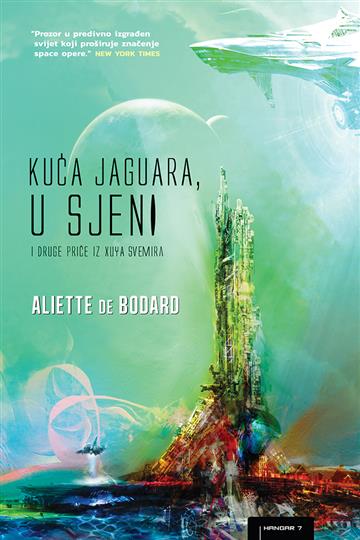A Universe of Twists and Beauty.
Everybody knows what a good space opera needs: at least one galaxy-spanning empire, space stations, fast ships, political shenanigans, and wars. And Aliette de Bodard’s Xuya universe provides all that – but, with a twist.

Now, things with a twist often depend on that twist alone, and end up being one-trick ponies. That is not the case with the Xuya universe. Partially, that’s because the twist is actually a whole bunch of them: the world in which the Chinese discovered America way before Columbus has a history that is significantly different from ours. Most notable, of course, is the continent of Xuya, which doesn’t get its name from the Italian explorer because, by the time Europeans get there, a loose alliance between China and Mexico has already formed. This alone would be a twist worth reading the whole bunch, but it’s not the end.
Leaning on her Kinh/Việt heritage, de Bodard changes history at another point, creating a Vietnam (Đại Việt) that manages to free itself of both French and Chinese influences and become an independent, significant player on the international and interstellar stage. Another twist, there, and one that will make things all the more interesting. But that’s not the end, either.

So far, so historical, you might say: what about the spaceships? De Bodard’s version of interstellar travel includes living ships. Not something we haven’t seen – whoever did not think of Anne McCaffrey, raise a hand – but again, there’s a twist, because these human-ships are born, and become part of families they’re born into. They have brothers, and mothers, and attend family gatherings (as holographic projections), and then, because ships are still much longer-lived than humans, have to watch their immediate families die, but their family lines go on. This twist alone would, again, make the Xuya universe worth reading, but no, that is, again, not the end.

In addition to all of these delicious departures from the norm, de Bodard also writes – and she writes beautifully, did I mention that? – with a wonderfully fresh perspective, about the people inhabiting her universe. Unlike the classic space-opera heroes, those people are firmly rooted in their families (with all the good and the bad things this kind of situation brings); they enjoy food (do not try reading de Bodard on an empty stomach!); they deal with human relationships and try to find a place for themselves within the wider community. Instead of lone heroes saving the Civilisation As We Know It, we have, in the universe of Xuya, cooperation and negotiations. That’s not to say that there are no conflicts; merely that blowing things up is not necessarily the best answer to everything. Instead of melodrama, we get melancholy; instead of spectacular heroism, we get people doing their best to cope, and often becoming heroic almost incidentally, while simply trying to do what they can.
And that is, fortunately, also not the end, because the Xuya universe keeps growing, and I hope it will continue to do so for many years. By now, it contains short stories and novellas; it has births and deaths; uprisings and wars; family and political problems; space ships and space stations; laughter and sadness. This is the stuff that best space-operas are made of.